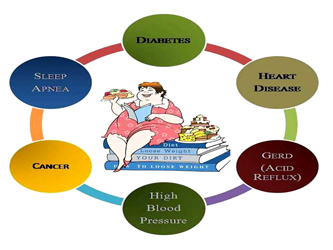
Obesity in Atrial Fibrillation and Respiratory diseases are a great threat to the well being of humanity
If you have been with us for a while now we have been discussing about the connections between obesity and several chronic health implications. In our most immediate article doctor Dalal Akoury helped us to get the insight about the connection between diabetes, hypertension, heart diseases and their association with obesity and weight gain. In this article we want to continue with the discussion singling out obesity in atrial fibrillation and respiratory diseases. Like we had said before the kinds of health complications associated with obesity can be very fatal. That is why doctor Akoury founded AWAREmed Health and Wellness Resource Center to help address various health issues affecting the societies today. The decision of Dr. Akoury to create this medical center was guided by her desire to transform people’s lives through increasing awareness about health and wellness and by empowering individuals to finding their own inner healing power. Dr. Akoury’s practice focuses primarily on personalized medicine through healthy lifestyle choices tailored to primary prevention and underlying causes instead of patching up symptoms. If you need help on matters pertaining addiction, weight gain, obesity, beauty among other health complications then you can schedule for an appointment with her today for professional treatment. In the meantime, let us get into the discussion of our topic (obesity in atrial fibrillation and respiratory diseases).
Atrial fibrillation is caused by an abnormal electrical system in the heart, which makes the upper chambers of the heart beat in a rapid and disorganized way. In some cases, the exact cause of atrial fibrillation is unknown, but conditions that affect the health of the heart, along with older age, are some of the known risk factors which may include:
The consequences of being obese is that, your heart may be damaged in the process leading to atrial fibrillation by causing pressure to build up in the blood vessels of the lungs. The implication of this is that pressure will be building up on the right side of the heart a factor that is always triggered by atrial. Remember that obesity also exacts pressure on your neck when sleeping. This compresses the neck and frustrates breathing a condition known as obstructive sleep apnea. Sleep apnea causes oxygen in the blood to dip down to dangerous levels, and that may cause functional and structural changes in the heart that trigger atrial fibrillation.
When a problem like this one sets into the body the only logical thing to do is to find not just solutions, but lasting once. Therefore for lasting solutions the place to be is AWAREmed Health and Wellness Resource Center under the able leadership of doctor Dalal Akoury. The experts at this facility understand the implications of obesity in atrial fibrillation and so they will help you in the most natural way to reduce your excess weight. In the process of losing weight, it is important that you know that if you already have atrial fibrillation then you must not relent in the process because health complications associated with obesity like high blood pressure, heart failure, and diabetes has high potential of triggering stroke which is the primary danger of atrial fibrillation. Therefore for precautionary measures the following weight loss techniques will be very helpful for you:
- Follow a heart-healthy diet low in saturated fats and rich in whole grains, fruits, and vegetables.
- Be physically active for at least 30 minutes periodically on a weekly basis.
- Ensure that your diabetes condition is put under good control.
- Reduce your consumption of salt.
- Sugar is not healthy so consume sparingly.
- Quite smoking.
- Avoid excess alcohol consumption.
Obesity is a worldwide public health problem, and more than 50% of adults in the United States for example are believed to be overweight or obese. Like I have indicated earlier obesity is inclined with numerous medical diseases, including diabetes mellitus, hypertension, cardiovascular disease, stroke, dyslipidemia, osteoarthritis, cancer, obstructive sleep apnea, and gall bladder disease. It is also associated with several abnormalities of respiratory function. Obesity is characterized by altered respiratory system mechanics, resulting in decreased lung volumes. This is related to decreased chest wall compliance from an elastic load on the chest and abdomen as well as decreased lung compliance resulting from the closure of dependent airways. Because of these abnormalities, a greater negative pleural pressure is needed to initiate airflow. Obese patients may also have reduced respiratory muscle strength. Respiratory system resistance is increased as a result of smaller airway caliber associated with decreased lung volumes. The resistance in the larger airways is typically normal. Some people with obesity may be hypoxemic, resulting from ventilation–perfusion mismatching, especially in the poorly expanded lung bases.
Sleep-disordered breathing, including obstructive sleep apnea (OSA) and alveolar hypoventilation, is extremely common among obese people and can contribute to the development of pulmonary hypertension and cor pulmonale. Morbidly obese patients are at increased risk for developing overt respiratory failure. Obesity hypoventilation syndrome (OHS), which is usually seen in more severe obesity, is characterized by daytime hypercapnia, an impaired central respiratory drive, and nocturnal hypoventilation. Such people often develop pulmonary hypertension, cor pulmonale, and respiratory failure.
Obesity is a major cause of dyspnea, exercise intolerance, functional limitation, disability, and impaired quality of life. The following physiological conditions impair exercise tolerance:
- Pulmonary function and gas exchange derangements
- Increased metabolic rate relative to lean body mass
- High metabolic (oxygen) cost to perform modest exercise
- Exaggerated cardiorespiratory response to exercise
- Circulatory impairment (claudication, microvascular disease, or both)
- Cardiac impairment as a result of myocardial ischemia; pulmonary or systemic hypertension
- Reduced respiratory muscle strength
- Anxiety
- Mechanical inefficiency
- Musculoskeletal disturbances
Regular exercise is a crucial component of weight loss intervention programs. Exercise training, more so when put together with calorie restriction, can lead to decreased body weight and fat, increased fat-free mass, improved strength and endurance, and improved aerobic fitness. However, traditional weight loss programs are generally not configured to meet the needs of morbidly obese people or obese patients with gas exchange impairments or respiratory failure. Comprehensive pulmonary rehabilitation is better suited to meet these complex needs, utilizing its components of exercise training (including recommendations for long-term adherence), collaborative self-management education, nutrition counseling, and psychological support for anxiety and depression while closely monitoring the patient’s respiratory status. Pulmonary rehabilitation can lead to lower body weight and improved functional status and health status in obese patients.
Goals of pulmonary rehabilitation for obese people with respiratory impairment include the following:
- Increased exercise tolerance
- Weight loss
- Increased self-efficacy
- Decreased disability and return to ADLs, hobbies, and work
- Acclimatization to or optimization of use of CPAP or BiPAP
- Optimal utilization of assistive equipment (related to mobility, self-care, and hygiene), home care services, and outpatient resources
Additional special considerations apply to the rehabilitation of people with morbid obesity and people with severe obesity with concomitant lower-extremity musculoskeletal disturbances. In general, such rehabilitation requires special equipment that can accommodate people of extreme weight. Morbidly obese people may not be able to use standard exercise equipment such as cycle ergometers and treadmills. Staff members must be familiar with the weight limits of the equipment in their programs. Walking, low-impact aerobics, and water-based activities are suitable forms of aerobic exercise for these patients. Recumbent bicycles, bariatric walkers, quad canes, commodes, wheelchairs, lifts, scales, and beds specially designed for obese people are commercially available. Extra staff may be needed to assist the morbidly obese patient with ambulation, transfers, stair climbing, and bed mobility. Extra-wide chairs that can accommodate extra weight should be available.











